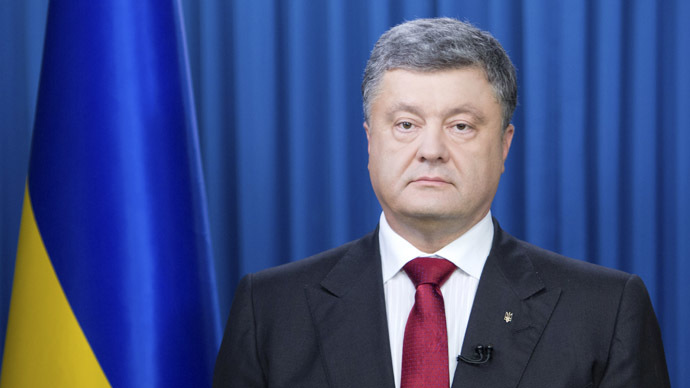‘Behavior of Kiev government is worthy of a banana republic, not a European state’

Ukraine’s President Petro Poroshenko discovered the new Constitution doesn’t suit him, so he needs to purge Parliament, and ban the Communist Party, John Laughland, director of studies at Institute of Democracy and Cooperation, told RT.
RT:Petro Poroshenko called some of the parliamentary factions a fifth column that undermines the government's policies. Also, the Communists were recently ousted from the parliament. Will we now see another political lynching?
John Laughland: Of course there is. How ironic, because the “EuroMaidan” revolution was predicated on the idea that the powers of the President of Ukraine should be drastically reduced in favor of those of the Parliament, and the very moment when President Yanukovich was overthrown on February 21, the very next day Parliament voted itself new powers in time to go back to the 2004 Constitution. Now the new President Poroshenko discovers that actually this new Constitution doesn’t suit him, so he needs to purge the Parliament, he needs to stigmatize people who don’t agree with his policy as fifth columnists, he needs to ban the Communist Party. And above all, he and his cronies, the government itself, the Prime Minister and other ministers, they are of course trying to wreck the elections by changing the electoral law in advance of the polls so that they get the Parliament they want. It’s obvious that it is worthy of a banana republic, that is not worthy behavior of a European state.
RT:Will the President now try to form a parliament that will basically pass anything he tells them to? And could a parliamentary overhaul be just an attempt to shake off responsibility for recent decisions such as the military operation?
JL: It’s difficult to say. Obviously the large part of the answer to that question depends on what will happen to the Party of the Regions. It was decapitated in February, it hasn’t yet found a new leader who is capable of taking things forward, and part of its electorate doesn’t want to belong to Ukraine anyway and is engaged in a civil war. That will be the decisive factor – to what extent the Yanukovich party will be able to bring it together and fight the elections in any meaningful sense. Obviously, the new power will put every single obstacle in its way. But I think it is very important to emphasize as we saw in last week's fake resignation of Prime Minister Yatsenyuk, that there are of course divisions not only between East and West, between pro- and anti-Russians in Ukraine, but also within the pro-Western fraction itself, between the Udar, the Svoboda and the Fatherland parties. We know from the Orange revolution in 2004 that this coalition fell apart after year or so, will the same thing happen this time again, that’s one of the other things we need to watch.
RT:The country's Prime Minister tried resigning around a week ago, but failed. In your opinion, was it a PR stunt or a real attempt to distance himself from the power elite?
JL: I think basically a lot of Ukrainian politics is explained by money and obviously the war is costing money, Ukraine is on the brink of default and some of the political parties who are controlled by oligarchs - let’s not forget the role of oligarchs is absolutely key in Ukrainian politics - perhaps started to cut up a bit difficult about paying for this war. Yatsenyuk, when I said fake resignation, it was a classic parliamentary maneuvering in a sense that he made the vote for new money for the war a matter of confidence and therefore, put his own job on the line and thereby managed to get these dissident parties back on board. Let’s see how long it lasts, let’s see how long it takes for this heteroclite coalition to stay in place. It did not last long in 2004; it fell apart after year and a half. It may well last for another few months in Ukraine but in long-term prospect we have to wait and see.
The statements, views and opinions expressed in this column are solely those of the author and do not necessarily represent those of RT.
The statements, views and opinions expressed in this column are solely those of the author and do not necessarily represent those of RT.












